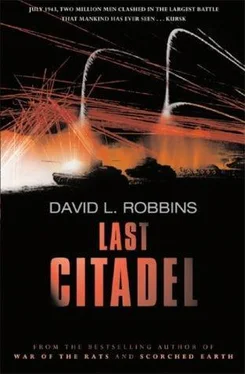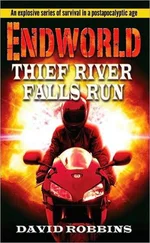At noon, Luis began to receive messages from General Hoth’s headquarters. Papa Hoth had made the decision to move up into the no-man’s-land between his forces and the Reds’, to improve his position for the jump-off in the coming morning hours. They needed to eliminate enemy forward strongpoints and observation posts, and find the exact location of the Soviets’ first line of defenses. The black blocks of 4th Panzer began to tighten. At 1445 hours, couriers from the bowels of the building ferried in a burst of messages: An air raid had begun over the Russians around Butovo, near the center of Hoth’s line. The first thrust of Citadel had begun. One of the quiet stick-handlers around the table laid a small carved airplane over the Russian town.
Another ten minutes passed. Luis handled another page: An artillery barrage followed the planes, conventional artillery was joined by Nebelwerfer rocket batteries to pummel and unnerve the Soviet advance positions. Then the middle of Hoth’s line rushed forward at the Russian strongpoints of Gertsovka, Butovo, and Streletskoye. Luis watched one of the stick-boys shove the black blocks to the north.
When the attack was less than fifteen minutes old, the sky opened with a blinding rainstorm. The map room shuddered under the thunderclaps, barely muffled by the heavy curtains and thick brick walls. The messages kept up a steady stream into Luis’s hands and the pieces on the board made their way north, into the Russian defenses, slogging over the dry map. Luis knew the sounds of combat, he knew the suck and slip of mud under boots and wheels and treads. The whiz of a bullet is different when it slices through rain to get to you, you hear it coming sooner and you hear it pass longer. None of these were on the map with its charging black bits and the reeling red pieces, nor were they on the faces of Breit or Grimm or the stick-boys or messengers quick-stepping in with the news. The sounds were only in Luis’s ears. He imagined himself standing in the turret of Erich Thoma’s Tiger, leading the assault, and it was bitter for him waiting for the blocks labeled Leibstandarte Adolf Hitler to move ahead. So far the three SS divisions had stayed out of the initial stages of the fray.
The afternoon hours passed, too, this way, quieter once the thunder rolled off, leaving the shuffle of feet and pages, the dry slide of wood pieces over paper. The attack was taking place fifteen miles west of Belgorod, stretching another ten miles to the west. Luis followed events with a tension in his chest he fought to hide. German forces struck the defenders between Berezov and Streletskoye, surrounding a Soviet battalion and driving off the rest. A fierce fight took place for control of Gertsovka. A German battalion commander was badly wounded and one-third of his men were hit, including the commander’s replacement. At 2100 hours Gertsovka was cleared but at a high price for both armies. Butovo to the east was taken, the Soviet garrison was driven off, but not before Russian riflemen put up a seven-hour brawl that left all of their number dead. Their epitaph was a black block pushed into Butovo over their bodies.
The three blocks of the SS Panzer Divisions did not move throughout the day, while the rest of the German lines improved their positions. Luis wanted to ask Colonel Breit if he might go out to observe firsthand the situation, but instead bit his tongue and dealt with his task. Sometimes you have to go to the bull, but often enough it comes to you.
After midnight, at on 5 hours on the morning of July 5, Luis handed a message to Colonel Breit detailing the entry into battle of the three SS Panzer Divisions. Within the next hour, these divisions destroyed half the forward outposts of the Russian 6th Guards Army and forced many others to withdraw. Luis himself slid the tank icon of his Leibstandarte comrades into the Red lines.
Luis was exhausted, he’d been at his station for twenty-three hours. Colonel Breit slipped out of the situation room, Major Grimm was long gone. Luis was left in charge. He told the stick-boys he would be back in a minute.
Outside, rain pelted the street, peals of thunder pounced. Operation Citadel had begun in this, glimpses of the enemy came in split-second flashes from lightning, the explosions of shells were lost in Nature’s din. The world had been torn open here around Kursk. Luis said a prayer aloud in Spanish. This was his father’s practice before the bulls and in the last five years Luis had made it his own custom against men. He asked for victory. His words trudged out into the downpour like soldiers.
THE STRONGEST FORTRESS IN THE WORLD
The German Supreme Command was committing exactly the same error as in the previous year. Then we attacked the city of Stalingrad, now we were to attack the fortress of Kursk. In both cases the German Army threw away all its advantages in mobile tactics, and met the Russians on ground of their own choosing. Yet the campaigns of 1941 and 1942 had proved that our panzers were virtually invincible if they were allowed to maneuver freely across the great plains of Russia. Instead… the German Supreme Command could think of nothing better than to fling our magnificent panzer divisions against Kursk, which had now become the strongest fortress in the world.
Major General F. W. von Mellenthin
Panzer battles
July 5
0330 hours
Vladimirovka
Dimitri tugged the tarp tighter under his chin. He’d made a makeshift hood and poncho out of the oiled sheet and let the rain tumble over him. The heavy drops pattered over his covered shoulders and crown. Even with the chattering of the rain in his ears he could hear the explosions.
The German and Red armies traded blows in this hour before dawn, preparation and counter-preparation. A thousand artillery pieces on both sides lofted shells, one at the other, like arguing spouses, while the earth, a sick and sad child between them, shivered under Dimitri’s boots. He leaned against his tank, alone it seemed, under the rain, watching and listening to the beginnings of the battle. His son and crew were in their covered foxhole riding out the storm. The rest of the tankers in the brigade were buttoned up out of the rain, too, inside their two dozen tanks or holes. Dimitri was glad to be alone with the thunders of God and man for these final minutes before the war came back to him. He said a few prayers for himself and his children. He didn’t know where Katya was. He could help God protect Valentin, but the daughter was off on her own, up in the sky doing who knew what. Dimitri had never been in a plane, the highest his feet had ever risen from the ground was sitting on a seventeen-hand horse. He didn’t know what to pray for her protection, he had only poor images of her dangers. He prayed for Katya that she remember she was a Cossack, and figured that was protection enough.
Lightning coursed overhead. He lifted his eyes to it and caught rain on his face. In the next minutes the rain eased to a drizzle. He walked to the hole where his crew slept and peeled back their tarpaulin.
‘It’s started,’ he said.
The three had been lying on their sides curled in the dirt like piglets. Pasha and Sasha had slept well, they yawned and slowly roused. Valentin was first to his feet. His eyes were rimmed, his mouth downturned.
‘Orders?’ he asked Dimitri.
‘Not yet. They’re coming, you can bet.’
Pasha and Sasha came up, the four of them in a row in their gray tanker’s coveralls. They faced south, checking the dripping sky. Then Dimitri heard not the boom of artillery but droning engines, higher than where the thunder had been. Soviet and German bombers and fighters were stepping into the fight, each side trying to pummel the other through the air before the clash of men on the ground. The four crewmen of General Platov leaned against their tank and gazed upward.
Читать дальше












